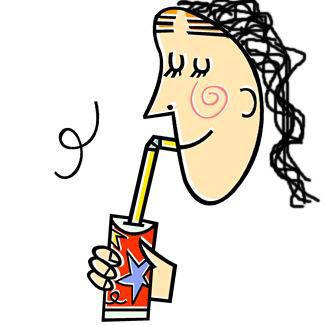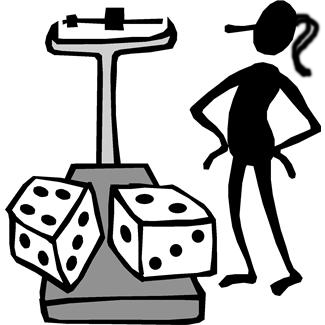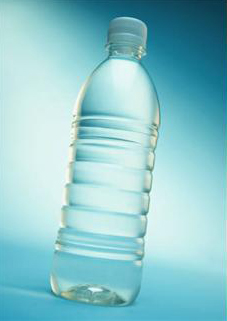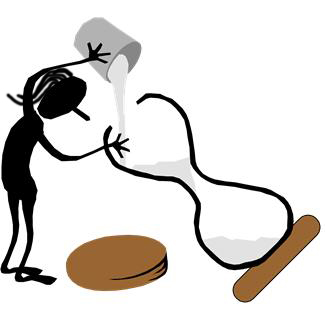Teen Weight Gain And Sugary Drinks: A Closer Look
TEEN WEIGHT GAIN AND SUGARY DRINKS: A CLOSER LOOK (ISSUE 48)
By Diane Gold
A recent headline in weight studies was
Program To Reduce Teen Intake Of Sugary Drinks Has Promise
 A study, published on Sept. 22, 2012 in the New England Journal of Medicine, looked at reducing the sugary drinks that teens drank for a year, using 224 teens. The study delivered non-caloric drinks to the homes of one-half of this teen group for a year, supplied coaching calls to parents, check-in visits and messaging with the participants. The other half just drank their sugary drinks, as usual.
A study, published on Sept. 22, 2012 in the New England Journal of Medicine, looked at reducing the sugary drinks that teens drank for a year, using 224 teens. The study delivered non-caloric drinks to the homes of one-half of this teen group for a year, supplied coaching calls to parents, check-in visits and messaging with the participants. The other half just drank their sugary drinks, as usual.
The study resulted in the group given non-caloric drinks and privy to coaching services, weighed, on average, 4 pounds less than the control group, after one year.
When we do studies, in order to validate them, we have to break down the parameters to make sure our measurements don’t overlap other factors. It’s very tricky to do. In this study, calories were measured but not what types of food groups they came from, coaching for parents existed with no measure of what parents believed at the onset or what they were economically able to comply with in terms of no sugary drinks in the house at the end of the study, and periodic messaging existed for participants but no mention of what it accomplished. The limitations in this study are common because we are so complex as human beings and every new stipulation we use costs more time which is money.
 Take away something without replacing it with something else in our lives and a gaping hole exists. To remove sugary drinks, we need to put something else there that will offer a reward of some kind. Otherwise, the emptiness becomes very uncomfortable.
Take away something without replacing it with something else in our lives and a gaping hole exists. To remove sugary drinks, we need to put something else there that will offer a reward of some kind. Otherwise, the emptiness becomes very uncomfortable.
Picture what happens when a hole is dug for a swimming pool but the pool never gets built. The big, gaping hole is damaging to the peace of mind of the yard, symbolic of the removal of our friend, the sugary drink, and can be painful. Pain causes old behavior.
 How much nicer it is when the hole is filled with something meaningful, like water for a refreshing swim, symbolic of water to drink.
How much nicer it is when the hole is filled with something meaningful, like water for a refreshing swim, symbolic of water to drink.
Here are some facts to think about.
THE LARGEST SINGLE SOURCE OF CALORIES
Let’s start with the surprising fact that “sugar intake from sugar-sweetened beverages alone, which are the largest single caloric food source in the United States, approaches 15% of the daily caloric intake … in several population groups” (Sonia Caprio, MD cites black and Mexican boys in her editorial, New England Journal Of Medicine online, quoting YC Wang in Pediatrics, 2008, and Nhanes III & Nhanes in Journal of Food Composition & Analysis, 2004).
When we are young, we require constant energy replenishment. In our consumeristic society, we are sold on the benefis of sugary drinks are from a very young age. What if we figured out a financially viable way to spend as much advertising capital on the merits of water or if we spent as much on packaging eye-appealing, reusable, collapsible water bottles as on sugary drinks? How would this affect our drinking habits and teen weight gain?
CONSIDER THESE 6 QUESTIONS
1) Is it the sugar in liquid form that causes weight gain due to its ease of absorption?
FACT
Another study in the New England Journal Of Medicine found that cutting out soda from
teens’ diets resulted in a more dramatic weight loss than was shown with any other food.
 2) Are we craving drinking sweet liquid because we enjoy the way it feels, tastes or looks?
2) Are we craving drinking sweet liquid because we enjoy the way it feels, tastes or looks?
3) Are we subliminally seduced to sugary drinks because we have been programmed to like them?
4) Did the coached half of the 224 study participants crave the human interaction of ongoing messaging and check-in visits and that’s why they gained 4 pounds less?
ACCOUNTABILITY
Does the will to be accountable to someone else drive us to succeed? What if we could get an accountability partner for free? Would we do it?
There’s a new bulletin board at www.accountabilitypartnerfree.com where you can post a need and get a partner.
HUMAN CONTACT
What if we just crave the human contact from a mentor or coach? How do we translate that into getting that human interaction from our friends, our parents, ourselves?
NOTE: The mission of www.WarriorsOfWeight.com is to offer techniques and tools so that each of us can be independent enough to have resolve in ourselves and have enough strength to put our hands out to others.
PARENT COACHING
5) Did the coaching with parents cause the attitude change in the teens? Did this coaching cause superficial changes in the parents for that year alone?
We do know that, after the study year was over, during the follow up year, for the most part, parents went back to buying sugary drinks for the home, and teens went back to drinking sugary drinks at school or on their way home from school.
 ECONOMICS
ECONOMICS
6) Is the consumption of sugary drinks caused by the need for teenage fuel and the inability to afford designer drinks that are healthier? Is this same economic factor why teens don’t buy crystal clear water for snack?
Would the answers to these questions shed a different light on the results of this study or any study?
ENVIRONMENT VS. MINDSET
Dr. David Ludwig, senior author of the teen weight gain study, said of the fact that the teens gained weight after the study year and went back to drinking sugary drinks in the follow up year, “Permanent environmental changes are necessary for permanent weight loss.” True, if there were no sugary drinks in the school and no commercial propaganda on visual devices from an early age, there would be change.
I acknowledge Dr. Ludwig’s statement. If we remove sugary drinks from schools and eateries and ads, the next generation will be influenced correctly from the start. I would still like to add “Permanent mindset change is necessary for permanent weight loss.”
In 1-Step Consulting, we teach the impermanence of environmental changes as a whole. Of course, should the family of teens have maintained no sugary drinks in the house from the time the study finished, the teens would have had a big head start on caloric intake from sugary drinks. However, if there is no mindset change that includes
new drinking habits for health, as soon as the teen steps out of the protected environment that caused the change, the old habit will come back.
WHAT WEIGHT LOSS PROGRAMS LEAVE OUT
What is not emphasized from day 1 in any weight loss programs
I have seen is this very important factor: pick and learn a new behavior to replace the old. Just going through the motions of acting out a new habit is not enough. Each of us
must methodically place the new behavior in place so that we have something to do instead of our old behavior and nurture it.
Take my friend, T., who weighed in excess of 300 pounds. He decided he would have no food in his house for a full 3-month period. He had all his meals delivered, and he lost over 100 pounds. Then, he went back to keeping food in the house, going out to his precious restaurants, and he gained the weight right back again.
What didn’t he do?
He changed his environment, but he didn’t change his mind.
He reverted to his old environment, but his mindset hadn’t changed.
Result: weight regain.
CONCLUSION – WHAT’S IMPORTANT
The most important thing, whether it comes out of research, need, experimentation, embarking on a new program is the result. It’s about changing the mind in the desired direction. In order for the program to work well, the set up is very important.
 When a program talks about removing a substance or craving instead of adding pleasure with something new and awesome, whether drugs or sugary drinks, the program is talking about deprivation and pain instead of comfort and gratification. Addition instead of subtraction calms and nourish the mind; positive vs. negative speech conjures happy images. I am not saying to deny the goal or not to talk about it; but it’s more pleasurable to concentrate on adding than taking away. So why not use that tiny advantage!
When a program talks about removing a substance or craving instead of adding pleasure with something new and awesome, whether drugs or sugary drinks, the program is talking about deprivation and pain instead of comfort and gratification. Addition instead of subtraction calms and nourish the mind; positive vs. negative speech conjures happy images. I am not saying to deny the goal or not to talk about it; but it’s more pleasurable to concentrate on adding than taking away. So why not use that tiny advantage!
Why do we have such a high recidivism (relapse) rate in rehab programs? The older models believe in strengthening through insult and confrontation or threat. The newer models cater to motivation, listening and empathy.
And what about the many programs that base their success on changing the environment? Such as:
Don’t hang out with those friends.
Don’t stop at the arcade/mall on the way home.
We’ll move to another city.
No more sugary drink ads.
No more sugary drinks allowed in school.
Although the removal of negative influences can be an immediate fix, the only way to create new behavior is to change the mind. Scientifically, it is known that once we learn a habit, it is always in the background. However, we can choose a new habit and stack the old habit on the shelf. The only way to do this is to make the new mind the primary focus of any technique.
It is said that drinking sugary drinks is not addicting. What this means is that the body does not have a dependence on them. Because of this, a little mind adjustment can make the change, improve health and slow down teen weight gain from sugary drinks.
ACTION STEPS
1) Get a new glass just for this. (If money prevents, draw a design on your favorite glass you already have.)
2) Fill the glass 1 quarter of the way with water.
3) Put 2 ice cubes in it, if possible.
4) Slush the ice cubes around in the water to spread the cold.
5) Drink the water.
6) Repeat this 2 more times in the day.
7) Once you have accomplished this for 1 whole week every day, increase the water volume to 1 half the glass and repeat steps 3) to 6).
8) Once you have accomplished this for 1 whole week every day, increase to 6 times a day total or 1 whole glass of water 3 X.
9) Enjoy the water.
WarriorsofWeight Consulting
Click the image below for a helping hand.

If you need a hand, please don’t hesitate to reach out. Help is right here at http://warriorsofweight.com/2012/07/warriorsofweight-consulting .
FEEDBACK
Please leave a comment and LIKE.
DIANE GOLD, AUTHOR
Diane Gold, Founder of Warriors of Weight, Moms For Healthy Daughters, is a mentor in tai chi, kung fu and meditation, a music, fitness and stress expert and a dedicated mom.
She is confident that taking a small step now will change history. Diane says,
“Saying, “I can’t do anything; I don’t have money or power,” is easier than saying, “I can make a difference.” Even if we believe our small action will benefit no more than 1 person, even if it is ourselves, alone; take that action. Move ahead with that one step. If I take a step, then you take a similar step, then she takes a similar step; a movement is created. Let’s begin our movement with 1 step. ”
For help, check out 1-Step Consulting.








[…] Teen Weight Gain And Sugary Drinks: A Closer Look […]
[…] Teen Weight Gain And Sugary Drinks: A Closer Look […]